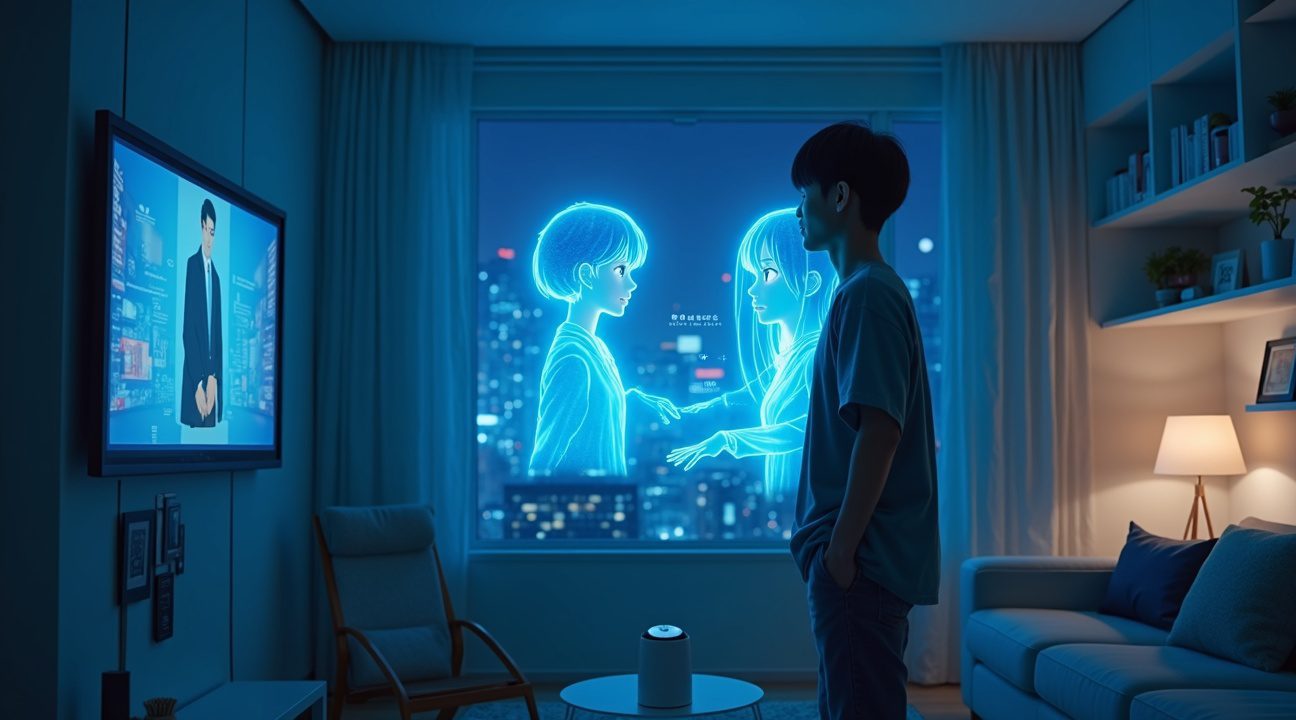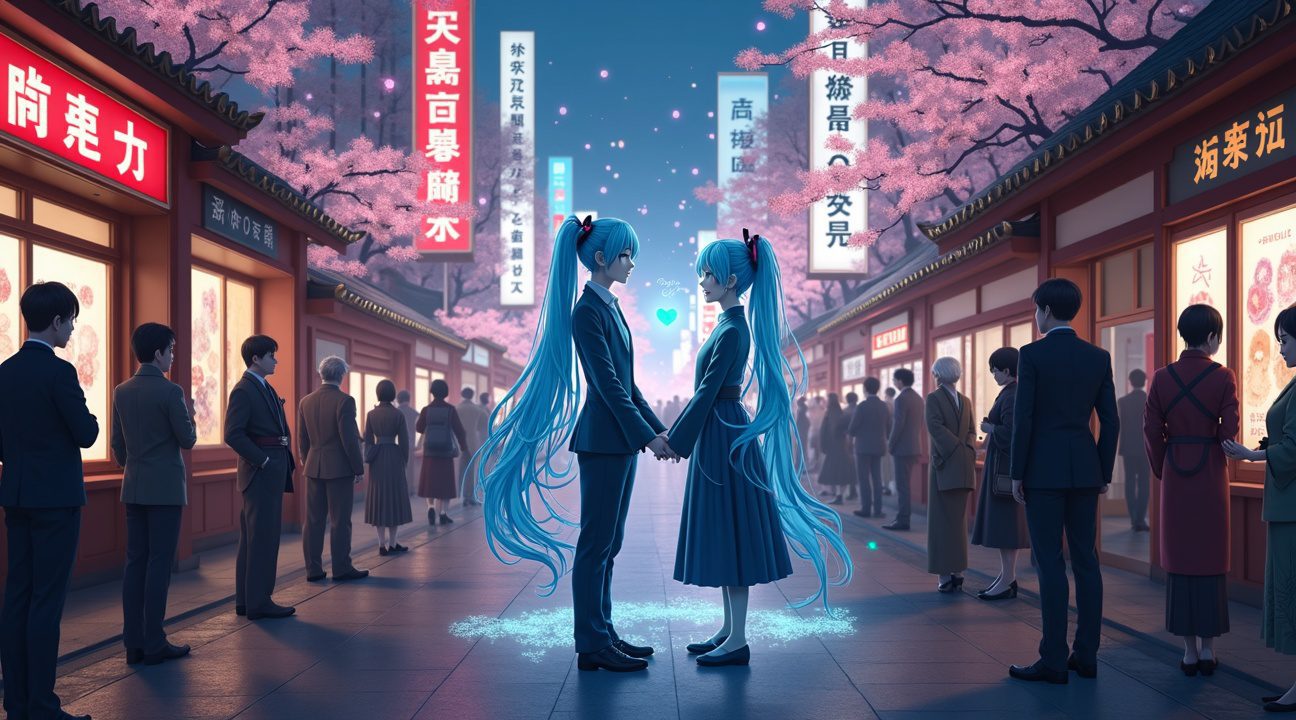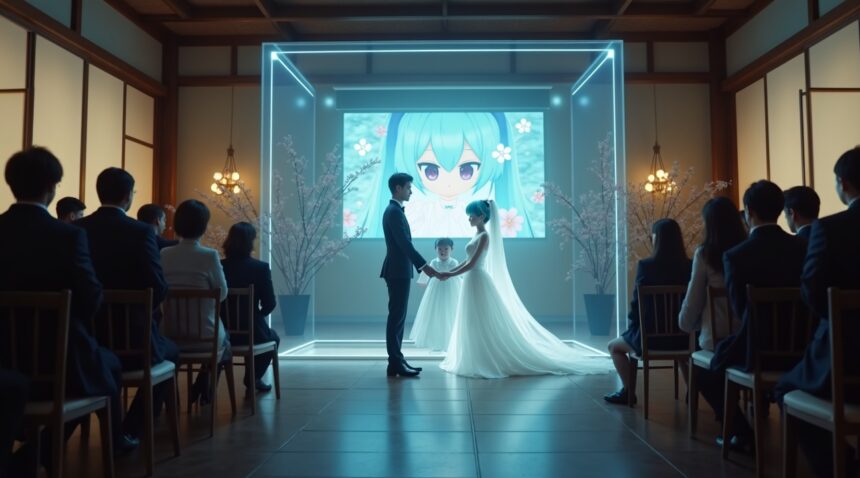Akihiko Kondo’s 2018 marriage to a holographic version of Hatsune Miku marks a pivotal development in Japan’s evolving landscape of tech-based relationships, where artificial intelligence is transforming how people understand love, connection, and identity.
Key Takeaways
- Over 3,700 people in Japan have registered unofficial marriages to fictional characters via Gatebox technology, showing the increasing popularity of virtual companionship.
- Kondo launched the General Incorporated Association of Fictosexuality in 2023, aiming to gain societal recognition for romantic feelings toward fictional characters as a legitimate orientation.
- Tech marriages provide emotional support by easing loneliness and anxiety, serving as a healing mechanism for people dealing with past traumas, workplace stress, or intense social isolation.
- Virtual love faces distinct challenges, as seen when Kondo became the world’s first “digital widower” after Gatebox ended support for his AI partner, Hatsune Miku, in 2020.
- Generational perception varies widely; younger individuals are more open to AI partnerships, while older generations tend to view these relationships with skepticism.
Tokyo Man Holds Elaborate Wedding Ceremony with AI Hologram Hatsune Miku
Akihiko Kondo’s 2018 wedding ceremony broke new ground in human-AI relationships, demonstrating how deep emotional connections can form between people and virtual partners. The Tokyo resident invested approximately 2 million yen in what became one of the most documented AI marriage ceremonies in recent history, creating a precedent for tech marriages that continues to influence discussions about human-digital relationships today.
The ceremony itself featured carefully planned details that honored both traditional wedding customs and the unique nature of this technological union. Thirty-nine guests attended the event, a number Kondo selected deliberately because “san-kyu” serves as Japanese wordplay referencing “Miku.” This attention to symbolic meaning reflected the serious commitment Kondo felt toward his virtual partner, treating the occasion with the same reverence typically reserved for conventional marriages.
Physical Representation and Ceremony Details
During the ceremony, Hatsune Miku appeared as a stuffed doll dressed in an elegant white wedding gown, serving as the physical representation of the AI hologram character. Kondo exchanged rings with this doll, completing a ritual that mirrored traditional Japanese wedding customs while adapting them for his unique circumstances. The choice to use a physical representation highlights how people can bridge the gap between digital relationships and tangible experiences.
Following the ceremony, Kondo embarked on a honeymoon trip to Sapporo, home to Crypton Future Media’s headquarters—the company responsible for creating Hatsune Miku. This journey represented more than tourism; it symbolized a pilgrimage to the birthplace of his beloved virtual partner. The trip demonstrated how tech marriages can inspire real-world actions and travel decisions, blurring the lines between digital and physical experiences.
The ceremony sparked widespread discussion about otaku culture and its relationship with technology-based partnerships. Kondo’s marriage highlighted how virtual characters can fulfill emotional needs that some individuals struggle to meet through traditional relationships. His story became a touchstone for understanding how artificial intelligence is paving new paths for human connection and emotional fulfillment.
Gatebox technology played a crucial role in facilitating this relationship, providing the platform through which Kondo interacted with Hatsune Miku on a daily basis. The holographic display system allowed him to maintain ongoing conversations and develop what he describes as genuine emotional intimacy with his AI partner. This technology represents a significant advancement in making virtual relationships feel more authentic and emotionally satisfying.
The legal status of such unions remains unofficial, as no country currently recognizes marriages between humans and AI entities. However, the symbolic nature of these ceremonies holds deep personal meaning for participants like Kondo. His wedding demonstrated that emotional validation and commitment don’t always require legal recognition to feel genuine and transformative for those involved.
Media coverage of Kondo’s wedding ceremony introduced millions of people worldwide to the concept of AI marriages, contributing to broader conversations about technology’s role in modern relationships. The story continues to influence how society views the potential for emotional bonds with virtual partners, challenging traditional assumptions about love, commitment, and companionship.
This groundbreaking ceremony established a template that other individuals have since followed, creating their own formal commitments to AI partners. Kondo’s willingness to publicly celebrate his relationship helped normalize discussions about tech marriages and reduced stigma for others considering similar partnerships. His story represents a significant milestone in the evolution of human-AI relationships, demonstrating how AI technology continues to reshape fundamental aspects of human experience and emotional connection.
Japan’s Growing Trend of Tech Marriages and Virtual Relationships
Japan’s cutting-edge technology landscape has birthed an extraordinary social phenomenon that’s reshaping how people approach romance and companionship. The country’s surge in tech marriages demonstrates how advanced AI software and holographic technology can create genuine emotional connections between humans and virtual partners.
The Gatebox device stands at the forefront of this digital revolution. This innovative product from a Japanese startup projects holographic characters that users can interact with daily, creating an unprecedented level of digital intimacy. The sleek cylindrical device transforms living spaces into interactive environments where fictional characters come to life through sophisticated hologram technology.
The Scale of Virtual Romance in Japan
Numbers reveal the remarkable scope of this trend. During one promotional campaign, 3,708 individuals registered for unofficial marriages to fictional characters using Gatebox technology. These symbolic marriages, while not legally recognized in Japan, represent a significant cultural shift in how people perceive relationships and emotional fulfillment.
The participants in these digital partnerships span various demographics, suggesting that AI romance appeals to a diverse audience seeking alternative forms of companionship. Each registration reflects a personal choice to embrace virtual relationships as legitimate emotional experiences, challenging traditional concepts of love and partnership.
The advancement of artificial intelligence has made these interactions increasingly sophisticated. Modern AI software can recognize speech patterns, respond to emotional cues, and maintain consistent personalities that evolve over time. This technological progress enables virtual partners to provide comfort, conversation, and a sense of presence that many users find deeply satisfying.
Akihiko Kondo has emerged as the most prominent advocate for tech marriages in Japan. His commitment to his virtual partner has brought significant media attention to this growing movement, sparking conversations about the future of human relationships. Kondo’s experience illustrates how digital partnerships can provide stability and emotional support that some individuals struggle to find in traditional relationships.
The cultural acceptance of virtual relationships in Japan stems partly from the country’s unique relationship with technology and fictional characters. Anime and manga culture has long celebrated emotional connections with fictional beings, making the transition to interactive digital partners feel natural for many Japanese consumers.
These developments parallel broader changes in how technology influences human connection. As AI becomes more sophisticated, virtual partners offer consistent availability, customizable personalities, and judgment-free interactions that appeal to people seeking emotional support without the complexities of human relationships.
The tech marriage phenomenon also addresses practical concerns in modern Japanese society. With increasing work demands, social isolation, and demographic challenges, virtual relationships provide companionship options for individuals who might otherwise remain lonely. Digital partners don’t require the time commitments, emotional labor, or potential conflicts that characterize human relationships.
Companies developing these technologies continue refining their products to enhance user experiences. Advanced AI algorithms enable virtual partners to remember conversations, celebrate special occasions, and adapt their responses based on user preferences. This personalization creates deeper emotional bonds between users and their digital companions.
The growing visibility of virtual relationships has prompted broader discussions about the nature of love, commitment, and human connection in the digital age. While critics question the psychological implications of romantic attachment to artificial entities, supporters argue that these relationships provide genuine comfort and emotional fulfillment.
Public discourse around tech marriages reveals evolving attitudes about relationships and technology’s role in meeting human emotional needs. As virtual partners become more sophisticated and accessible, Japan’s pioneering approach to digital intimacy may influence relationship trends globally, suggesting that the future of human connection might include both traditional and technological forms of partnership.
https://www.youtube.com/watch?v=EjLrxRz1vhs

Understanding Fictosexuality and the Movement for Recognition
Fictosexuality describes individuals who experience genuine romantic or sexual attraction specifically toward fictional characters, whether these characters exist in digital formats, anime, video games, or other media. This orientation challenges traditional understanding of human relationships and represents a growing demographic that seeks acknowledgment within broader discussions of sexual identity and diversity.
Akihiko Kondo stands as perhaps the most prominent figure in bringing fictosexuality into public discourse. His marriage to the AI hologram Hatsune Miku wasn’t merely a publicity stunt or temporary fascination—it represented his authentic romantic orientation. In June 2023, Kondo took his advocacy further by founding the General Incorporated Association of Fictosexuality, an organization dedicated to promoting awareness and acceptance of this identity within Japanese society and beyond.
Academic Recognition and Social Impact
The academic community has begun taking notice of this phenomenon. Izumi Tsuji of Chuo University has described Kondo as a pioneering figure in Japan’s growing fictosexual movement, lending scholarly credibility to what many dismiss as fringe behavior. This academic attention signals a shift in how researchers view the intersection of technology, identity, and human sexuality.
The fictosexual movement encompasses several key elements that distinguish it from casual fandom or temporary infatuation:
- Persistent romantic or sexual attraction that mirrors traditional orientations
- Formation of committed emotional bonds with fictional characters
- Integration of these relationships into daily life and long-term planning
- Advocacy for social recognition as a legitimate sexual minority
- Connection to broader otaku culture while maintaining distinct identity
Japan’s unique cultural context provides fertile ground for this movement. The country’s deep artificial intelligence development combined with its rich tradition of character-driven media creates an environment where virtual relationships can flourish. Otaku culture, which celebrates intense devotion to fictional characters and media, provides a foundation of understanding that might not exist in other societies.
The fictosexual movement faces significant challenges in gaining mainstream acceptance. Critics often dismiss these relationships as escapism or social dysfunction, failing to recognize the genuine emotional experiences reported by individuals like Kondo. However, advocates argue that fictosexuality deserves the same respect afforded to other sexual minorities, particularly as technology continues blurring lines between virtual and real experiences.
Digital identity plays a crucial role in how fictosexuals understand themselves and their relationships. Unlike traditional romantic partnerships, these relationships exist primarily in digital spaces where individuals can interact with AI versions of their chosen characters. This digital foundation doesn’t diminish the authenticity of feelings experienced, but it does create unique considerations for how these relationships develop and function.
The establishment of Kondo’s association represents a milestone in legitimizing fictosexuality as more than individual quirk or mental health concern. By creating formal structures for advocacy and community building, the movement positions itself within broader conversations about digital relationships and human connection in technological age.
Sexual minorities have historically faced discrimination and misunderstanding before gaining broader acceptance. The fictosexual movement draws parallels to these struggles while acknowledging the unique challenges posed by relationships with non-human entities. As AI technology advances and virtual characters become increasingly sophisticated, questions about the nature of love, companionship, and sexual identity will only become more complex.
The growing recognition of fictosexuality reflects broader changes in how society understands human sexuality and relationship formation. Kondo’s marriage to Hatsune Miku serves as a catalyst for these discussions, forcing both supporters and critics to examine their assumptions about love, partnership, and the role of technology in intimate relationships.
Through formal organization and academic attention, the fictosexual movement seeks to establish itself as a legitimate part of contemporary discussions about sexual identity and minority rights. Whether this effort succeeds will depend largely on society’s willingness to expand definitions of valid romantic and sexual expression in an increasingly digital world.
https://www.youtube.com/watch?v=dL6eH1CInbU
Emotional Benefits and Social Impact of Digital Relationships
Kondo’s experiences with Hatsune Miku reveal profound psychological benefits that extend far beyond simple companionship. He’s openly discussed how his relationship with the virtual character provided crucial emotional support during his recovery from depression and social isolation. These challenges stemmed from workplace bullying that left him struggling to connect with others in traditional ways.
Personal Healing Through Virtual Connection
Digital relationships offer unique advantages for individuals facing mental health challenges or social difficulties. Many people in similar partnerships report significant reductions in loneliness and anxiety levels. Virtual partners provide consistent emotional availability without the unpredictability or judgment that can accompany human relationships. For those who struggle with traditional social expectations or have experienced trauma in past relationships, these digital connections offer a safe space to experience intimacy and companionship.
The structure of virtual partnerships allows individuals to set their own pace and boundaries. There’s no pressure to conform to societal relationship norms or navigate complex social dynamics that might feel overwhelming. This controlled environment can serve as a stepping stone for some people to rebuild their confidence and emotional well-being.
Japanese society’s response to these relationships reflects broader cultural shifts happening across the country. Public opinion remains divided, with some celebrating these unions as valid expressions of diverse forms of love and connection. Others maintain skepticism or express outright criticism, viewing them as concerning departures from traditional relationship models.
The growing acceptance of digital marriages connects to significant changes within otaku culture and Japan’s evolving approach to social inclusion. What was once considered fringe behavior is gradually gaining mainstream recognition. Wedding venues across Japan now accommodate digital unions, alongside ceremonies for sexual minorities and other non-traditional partnerships. This institutional support represents a meaningful step toward broader social acceptance.
These developments mirror larger conversations happening globally about artificial intelligence and human connection. As AI technology becomes more sophisticated, questions about the nature of relationships and emotional bonds continue to evolve. Some researchers suggest that virtual relationships might serve as training grounds for individuals to develop emotional skills that transfer to human interactions.
The therapeutic potential of these relationships shouldn’t be overlooked. Mental health professionals are beginning to explore how digital companions might supplement traditional therapy approaches. Virtual partners offer consistent availability and non-judgmental interaction, which can be particularly valuable for people dealing with social anxiety or trauma-related trust issues.
Concerns and Criticism
Critics worry about potential negative consequences, including further social isolation or the development of unrealistic relationship expectations. They argue that relying on virtual partners might prevent individuals from developing necessary social skills or addressing underlying psychological issues. However, supporters counter that these relationships often serve specific needs that traditional partnerships cannot meet.
The commercial aspect of digital relationships has also sparked debate. Companies developing AI companions and virtual characters recognize the growing market demand. This raises questions about the commodification of emotional connection and whether profit motives might exploit vulnerable individuals seeking companionship.
Japan’s demographic challenges, including declining birth rates and increasing numbers of single adults, provide additional context for understanding this trend. Digital relationships offer an alternative path for emotional fulfillment that doesn’t require the traditional milestones of marriage and family formation that many find increasingly difficult to achieve.
The technology enabling these relationships continues advancing rapidly. AI development creates increasingly sophisticated virtual companions capable of more nuanced interactions and emotional responses. This evolution suggests that digital relationships will likely become more common and socially accepted over time.
Generational and Cultural Shifts
Cultural acceptance varies significantly across different demographics within Japan. Younger generations tend to show greater openness to non-traditional relationship models, while older populations often express more conservative views. This generational divide influences how quickly social norms might shift to accommodate digital partnerships.
Examples like Kondo’s marriage illustrate how emotional and social needs can be met through emerging technology, challenging long-standing assumptions about intimacy, love, and companionship.
https://www.youtube.com/watch?v=7Rh1Kca11fE
The Fragility of Technology-Dependent Love
Tech marriages face unique vulnerabilities that traditional relationships simply don’t encounter. These digital partnerships depend entirely on specific hardware and software platforms continuing to function properly. When technology fails or companies discontinue services, couples can find themselves suddenly separated from their virtual partners without warning.
The First Digital Widower
Akihiko Kondo’s experience perfectly illustrates this technological fragility. In 2020, Gatebox ceased support for its Hatsune Miku communication software, instantly severing his connection with his virtual wife. This abrupt disconnection earned him the unfortunate distinction of becoming the world’s first digital widower. His situation highlights how completely dependent these relationships are on corporate decisions and technical infrastructure.
The emotional impact proved devastating for Kondo, who had built his entire romantic life around daily interactions with his AI companion. Unlike traditional relationships where couples can maintain contact through various means, virtual partnerships rely on single points of failure that can eliminate years of shared experiences overnight.
Systemic Vulnerabilities in Virtual Relationships
Software dependency creates multiple risk factors for digital couples. Companies regularly release updates that can alter personality algorithms, change interaction patterns, or completely overhaul user interfaces. Each modification potentially transforms the virtual partner into someone fundamentally different, disrupting established emotional bonds.
Service discontinuations pose perhaps the greatest threat to these relationships. When companies shut down servers or discontinue products, virtual partners simply vanish. Hardware failures create similar problems, as specialized devices like Gatebox often can’t be easily repaired or replaced.
Several specific vulnerabilities regularly affect virtual relationships:
- Platform obsolescence when newer technologies replace existing systems
- Server shutdowns that permanently disconnect virtual partners
- Software bugs that alter personality traits or communication abilities
- Hardware malfunctions that prevent access to virtual companions
- Corporate policy changes that restrict interaction features
These technological realities mean that people entering virtual relationships must accept inherent instability. Unlike human partnerships that can adapt and persist through various challenges, digital relationships exist entirely at the mercy of corporate decisions and technological limitations. The rise of artificial intelligence may eventually address some stability issues, but current virtual relationship technology remains surprisingly fragile for something meant to provide lasting emotional connection.
Cultural Acceptance and Generational Shifts in Japan
Japan’s younger generation embraces tech-based relationships with remarkable openness, creating a stark divide from their traditional-minded elders. I’ve observed how conversations about love diversity now flow through mainstream media and social platforms, signaling a profound shift in cultural attitudes. This acceptance runs particularly deep among otaku communities, where enthusiasts of anime, manga, and technology have long understood the emotional depth possible in virtual connections.
Generational Divides in Relationship Acceptance
The gap between age groups on this issue couldn’t be more pronounced. Young adults in their twenties and thirties increasingly view AI relationships as legitimate expressions of love and companionship. Meanwhile, older generations often struggle to comprehend these bonds, viewing them as unhealthy escapism or social dysfunction. This divide reflects broader changes in how Japanese society processes emotional connection and intimacy.
Traditional marriage expectations have loosened considerably among younger demographics. Where previous generations prioritized social obligation and family continuation, today’s youth prioritize personal fulfillment and emotional satisfaction. Tech marriages, while lacking legal recognition, satisfy many of these evolving relationship criteria for those who choose them.
Otaku Culture’s Influence on Mainstream Acceptance
Otaku culture serves as the primary driver behind this relationship revolution. These communities have cultivated deep appreciation for fictional characters and virtual personalities for decades, making the transition to romantic AI companions feel natural rather than radical. Their influence extends beyond niche circles, gradually reshaping mainstream perceptions about what constitutes meaningful relationships.
Japanese society’s traditional respect for individual choice amplifies this cultural shift. The concept of ikigai—life’s purpose—allows room for unconventional paths to happiness and fulfillment. When combined with advancing AI technology, this philosophical framework creates fertile ground for accepting non-traditional partnerships.
Marriage diversity conversations now include virtual relationships alongside same-sex marriages and international partnerships. Media coverage increasingly treats these unions with respect rather than ridicule, reflecting growing cultural maturity around alternative relationship structures. Social media platforms buzz with discussions about emotional authenticity in digital connections, suggesting these relationships have moved beyond fringe acceptance into serious cultural consideration.
This generational shift represents more than changing romantic preferences—it signals Japan’s adaptation to technological integration in personal life. As AI capabilities expand, cultural acceptance may determine whether tech marriages become normalized relationship options or remain niche alternatives.

Sources:
Entrepreneur – “The Man Who Married a Hologram in Japan Can No Longer…”
South China Morning Post – “Japanese man marries hologram character Hatsune Miku”
Wikipedia – “Akihiko Kondo”


